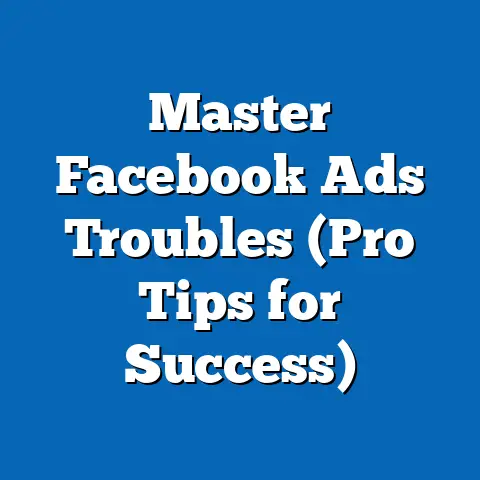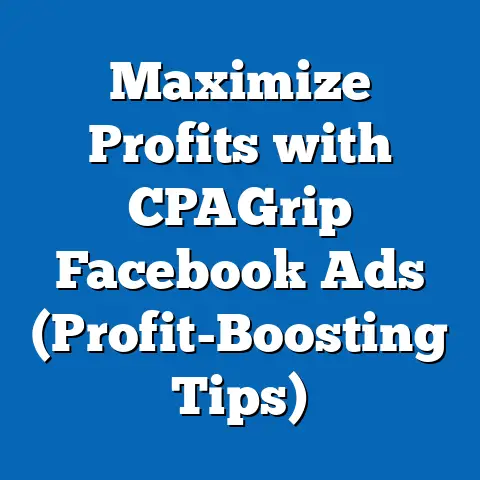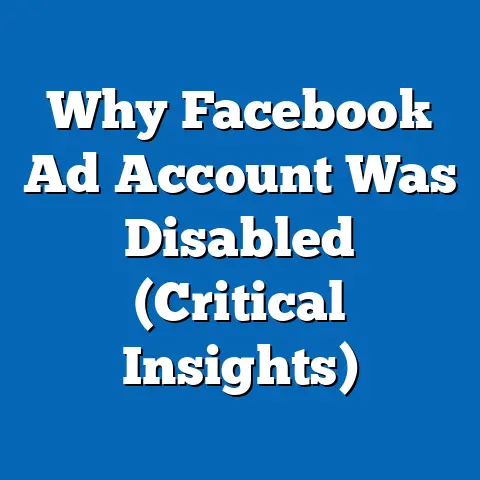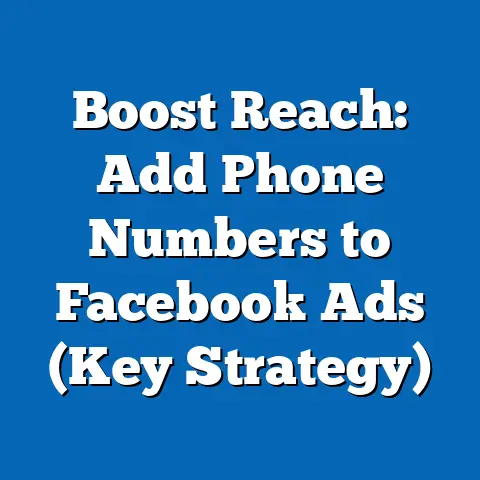Have Facebook Ads Become Tougher for Lawyers? (Expert Insights)
Facebook, now under the umbrella of Meta, has transformed the landscape of digital advertising since its launch in 2004, offering businesses and professionals unprecedented access to targeted audiences.
For lawyers, Facebook Ads have become a critical tool for client acquisition, allowing them to reach potential clients based on demographics, interests, and behaviors with remarkable precision.
However, as the platform has evolved, so too have the challenges associated with advertising, particularly for professionals in highly regulated fields like law.
Section 1: Functionality and Defining Characteristics of Facebook Ads for Lawyers
Facebook Ads operate on a sophisticated algorithm that prioritizes user engagement, relevance, and advertiser objectives.
For lawyers, the platform offers tools like detailed targeting options, which allow ads to be shown to users based on location, age, gender, interests, and even life events such as marriage or divorce—situations often necessitating legal services.
Additionally, features like Lead Ads enable direct contact form submissions, making it easier to convert potential clients into leads.
However, the platform’s defining characteristic—its ability to micro-target—has also become a double-edged sword.
While it offers precision, it raises ethical concerns about privacy and the potential for exploitation, particularly in sensitive fields like law where clients may be vulnerable.
Furthermore, Facebook’s ad review process, powered by AI and human oversight, scrutinizes content for compliance with its policies, often flagging legal ads for perceived violations related to sensitive topics or misleading claims.
The cost-per-click (CPC) and cost-per-lead (CPL) models also shape how lawyers use the platform.
According to a 2022 report by WordStream, the average CPC for legal services on Facebook is approximately $1.32, higher than many other industries due to the competitive nature of the field and the high lifetime value of a client.
This financial barrier can be particularly challenging for small or solo law firms with limited marketing budgets.
Section 2: Historical Context of Facebook Ads and Legal Marketing
To understand the current challenges, it’s essential to trace the historical evolution of Facebook Ads and their adoption by the legal profession.
When Facebook introduced its advertising platform in 2007 with “Flyers,” it was a rudimentary system with limited targeting capabilities.
By 2012, the platform had matured with the introduction of Custom Audiences and Lookalike Audiences, enabling advertisers to target users based on uploaded contact lists or similar profiles.
For lawyers, this period marked a significant shift in marketing strategies.
Traditional methods like billboards, TV commercials, and Yellow Pages listings were gradually supplemented, and in many cases replaced, by digital advertising.
The 2010s saw a surge in law firms using Facebook to build brand awareness and generate leads, particularly in personal injury, family law, and criminal defense—areas with high client demand and competition.
However, this growth coincided with increasing scrutiny of digital advertising.
The 2018 Cambridge Analytica scandal, where user data was misused for political advertising, prompted widespread concern about privacy and led to stricter regulations like the European Union’s General Data Protection Regulation (GDPR) and the California Consumer Privacy Act (CCPA).
These laws directly impacted how lawyers could collect and use data for advertising, requiring explicit user consent and greater transparency.
Moreover, in 2019, Facebook introduced its “Special Ad Categories” policy in response to criticism over discriminatory advertising practices.
Legal services were classified under this category, alongside housing and employment ads, meaning lawyers could no longer target users based on age, gender, or zip code—key demographics for identifying potential clients.
This policy shift marked a turning point, making it significantly harder for law firms to reach their intended audiences with precision.
Section 3: Societal Implications of Stricter Advertising Rules for Lawyers
The tightening of Facebook’s advertising policies and the broader regulatory environment have far-reaching societal implications.
On one hand, these changes aim to protect vulnerable populations from predatory or misleading advertising.
For instance, restricting targeting options reduces the risk of lawyers exploiting individuals in distress, such as those recently involved in accidents or facing legal disputes.
On the other hand, these restrictions can limit access to legal services for those who need them most.
Many individuals are unaware of their legal rights or the availability of representation until they encounter an ad tailored to their situation.
A 2021 study by the American Bar Association found that 40% of low-income Americans do not seek legal help due to a lack of awareness or resources, and targeted digital ads have historically played a role in bridging this gap.
Additionally, the increased difficulty in advertising on Facebook may exacerbate inequalities within the legal profession itself.
Large law firms with substantial budgets can pivot to alternative platforms or hire specialized digital marketing agencies to navigate these challenges, while smaller firms or solo practitioners may struggle to compete.
This disparity could lead to a concentration of market power among bigger players, potentially reducing client choice and driving up legal costs.
Section 4: Why Have Facebook Ads Become Tougher for Lawyers? Key Challenges
Several factors have converged to make Facebook Ads more challenging for lawyers in recent years.
Below, we explore the primary reasons, supported by data and expert perspectives.
4.1 Regulatory and Policy Changes
As mentioned earlier, Facebook’s Special Ad Categories policy has significantly restricted targeting capabilities for legal services.
According to digital marketing expert Sarah Johnson, CEO of LegalAdPro, “The inability to target by age or zip code has forced lawyers to cast a wider net, often resulting in lower conversion rates and higher ad spend.” This sentiment is echoed by a 2022 survey from Clio, a legal tech company, which found that 65% of law firms reported a decline in ad performance after the 2019 policy update.
Furthermore, compliance with data privacy






